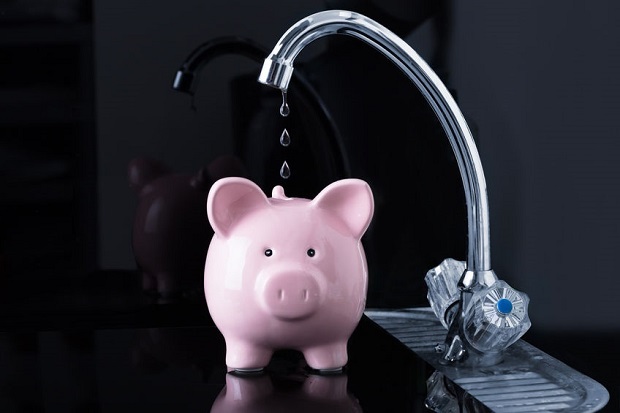
How Much Water Does a Dishwasher Use?
- The average water use for one dishwasher load is 6.1 gallons of water according to the Water Research Foundation’s “Residential End Uses of Water, Version 2: Executive Report.”
- A standard ENERGY STAR® certified dishwasher must not exceed 3.5 gallons of water per load.
- A compact ENERGY STAR® certified may not exceed 3.1 gallons of water per load.
- Older model dishwashers that are not ENERGY STAR® certified can use up to 10 gallons of water per load.
Residential End Uses of Water Survey
The Water Research Foundation conducted a survey of residential end uses of water and reported that the average water use for one dishwasher load is 6.1 gallons. The survey included 1,000 residential households and included all dishwasher models currently in use, including those that are energy efficient and use half that water, as well as older models that can use up to ten gallons of water per load.
New Dishwasher Models Save Water
Many of today’s new dishwasher models carry the ENERGY STAR® label, meaning they use substantially less water than older models and those that don’t qualify. To earn the ENERGY STAR® label, manufacturers must comply with a strict set of energy efficiency guidelines set forth by the EPA and Department of Energy. In the case of dishwashers, water efficiency factors in its certification criteria.
To qualify for ENERGY STAR® certification, a standard dishwasher must not exceed 3.5 gallons of water per load. Compact models may not exceed 3.1 gallons of water per load.
ENERGY STAR® defines a standard dishwasher as one that has a capacity equal to or greater than eight place settings plus six serving pieces, while a compact dishwasher has a capacity of less than eight place settings plus six serving pieces.
According to ENERGY STAR®, a standard-sized dishwasher that has earned the certification can save an average of 3,870 gallons of water over its lifetime and costs about $35. per year to run. The agency credits energy efficiency to the new innovative designs that include more efficient jets, soil sensors, and improved water filtration.
How To Save Money Running Your Dishwasher
Here are a few water-saving tips for the environmentally conscious dishwasher:
- Fill it up… but not too full. Unless you are in a rush to have clean dishes, wait until the dishwasher is filled up but still has enough space around the dishes for proper cleaning.
- Instead of rinsing your dishes before putting them in the dishwasher, just scrape off the bigger scraps and let the washer do the rest. Some models even have a pre-rinse that uses far less water than by-hand rinsing if you are worried about hard-to-clean dishes.
- Saving energy is good too. Since the main energy cost when using a dishwasher is in heating the water, which is also needed when washing by hand, the more water-efficient your dishwasher is, the more energy it conserves. Consider letting dishes air-dry overnight to save even more on that electric bill instead of using the dishwasher’s drying cycle.
Resources
- Water Research Foundation – “Residential End Uses of Water, Version 2: Executive Report.”
- EPA – “Water Efficiency Management Guide Residential Kitchen and Laundry.”
- Energy Star – “What Is Energy Star?”
- Energy Star – “Residential Dishwasher Version 6.0 Final Program Requirements.”
- Energy Star – “Dishwashers.”
Related Products
Shop for built-in dishwashers, portable dishwashers, specialty dishwashers, parts and accessories, and more.






